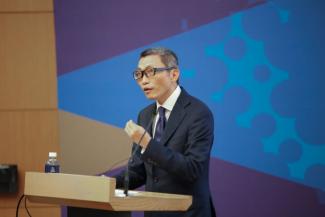
“I believe that education is the bedrock of modern day civilization. It is the fuel for technological innovation, social progress, cultivating right values, justice and equality. Education is never just about one person; it’s always about every single person. Education carries the hope of elevating entire communities of people,” declared Dr Chen Yidan at the inaugural lecture of the SMU Visionary Series held at the Mochtar Riady Auditorium on 31 May 2019.
“When we look at the wide range of challenges we face in the world today, it is clear that the purpose of education has gone beyond simply teaching individual students to excel in attaining knowledge. The world relies on education to unlock the potential of turning the limited into unlimited. That’s why I firmly believe that education is the fundamental driving force to social progress,” added Dr Chen.
Dr Chen, co-founder of Internet giant Tencent and founder of The Yidan Prize, spoke on the topic “Zero to Infinity: How Education Unlocks Endless Possibilities” to about 300 people in the audience, which included SMU President Professor Lily Kong, Provost Professor Timothy Clark, Dean of Lee Kong Chian School of Business Professor Gerry George, faculty, staff and students, as well as leaders and representatives from the public and private sectors.
The SMU Visionary Series, presented by the Lee Kong Chian School of Business, features the most transformational and globally impactful industry players and thinkers, from different spheres of influence, who will share their unique business insights and life lessons to stimulate ideas for a better marketplace and society.
In his speech, Dr Chen said that one of the biggest achievements of the modern world is increased literacy and the widespread implementation of basic education. This solid foundation is what gives young people, especially those coming from disadvantaged backgrounds, the self-esteem, confidence and opportunity to connect with the fast-changing world. It is also this solid foundation that gives rise to the infinite possibility of innovation.
He opined that education can instill in individuals the qualities required for innovation - an open mind, burning curiosity and the resourcefulness to put ideas into action. Highlighting that the decisions of educators and government policies are critical, Dr Chen said “Nurturing innovative human-capital and increasing inventive skills through well planned educational policies and interventions have the potential to spur a wide range of innovative outcomes.” Therefore, the important task facing policy-makers, investors, researchers and educators lies in understanding how their work and decisions will shape the innovativeness of future generations.

Dr Chen observed that innovation is a collaborative transformation of an industry or field which is never achieved by one person or one organisation. “Great innovation does not take place within one field of expertise but is the product of cross partnerships between different domains.” Therefore, if education is to fulfil its role as the mother of innovation, educators and policy makers need a clear picture of what inputs are being fed to the education ecosystem.
Using Stanford University and the Silicon Valley as an example of how schools and the private sector thrive together and reinforce innovation in each other’s DNA, Dr Chen commented that the innovative ecosystems in the education sector comprise evolving multi-party partnerships in which schools are able to tap into advanced tools and technologies from their partners for the benefit of students.
Dr Chen then touched on the Worldwide Educating for the Future Index (WEFFI) founded by the Yidan Prize Foundation in 2017. The Economist Intelligence Unit has been commissioned to write and produce the index on an annual basis. This study seeks to facilitate an actionable way forward for a better, more equitable future where young people are ready to tackle the evolving challenges of work and society.
Based on the findings of the 2018 WEFFI, Dr Chen praised Singapore for efforts in reviewing its education policy by “giving considerable attention to future-skills, putting in place an extensively developed framework that emphasises problem-based learning, and adjusting the scoring system for university entrance exams to consider factors beyond grades.”
Dr Chen also spoke about the Yidan Prize which he created in 2016. In addition to offering recognition of sustainable and innovative ideas that tackle pressing challenges in the field of education, the Yidan Prize is a platform for “explosive outcomes, world-changing educational endeavors”.


In a lively Question and Answer session moderated by Prof Gerry George, Dr Chen fielded numerous questions from an enthusiastic audience. Topics included the future of business education, the importance of lifelong learning, how can education instill a sense of optimism for future generations, and how will big data and artificial intelligence change the education landscape.